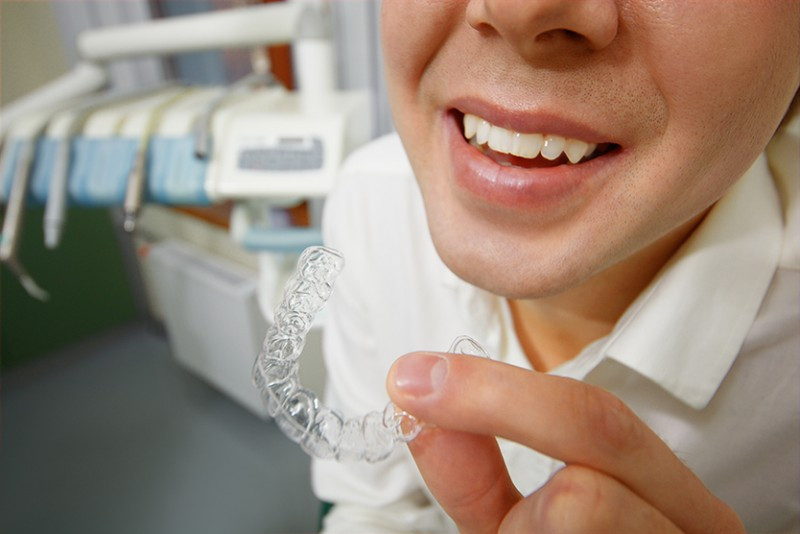Proper toothcare is a lifelong endeavor. It starts from the time that baby teeth start sprouting, which is typically around the age of six to 12 months. That's when the central incisors, top and bottom, come in and babies start being able to chew at least some of their food. For the rest of our lives, presumably, we are taught and then take over the daily care of our teeth. Brushing and flossing are the primary modes of caring for our teeth. We earn a grade of A if we thoroughly brush after every meal and floss at least once or twice a day. Most of us settle for what probably is a grade of B or a C in that regard, but we know we need to do those things regularly to avoid cavities, to be able to chew our food and to flash that gleaming smile every chance we get. Here's the thing, though; proper tooth care doesn't begin and end with brushing and flossing (as well as the two trips to the dentist each year for checkups). We also must guard against damage to our teeth, and that can come in a number of forms that all the brushing and flossing in the world can't prevent or fix. First, it helps to know about the structure of our teeth – what they are made of and what keeps them in place. Our teeth are comprised of layers, beginning with the outside layer of enamel, a combination of calcium and phosphorous that comprise our body's hardest substance. Going from the outside in, the next layer is dentin – not to be confused with Dentyne chewing gum – which is a bone-like but porous substance, as health.harvard.edu describes it. The innermost layer is the pulp, which is a network of nerves, connective tissue and blood vessels. Teeth are held in the jawbone by roots and held there by periodontal ligaments. So, what can go wrong, other than cavities, impacted teeth and nerve issues begging a root canal – you know, the usual? Plenty. Here are several things you need to consider in caring for your teeth:
- Chewing ice. Harmless, right? Wrong. Biting down on hard, frozen cubes can chip or crack your teeth. This can also irritate soft tissue inside a tooth, resulting in toothaches. Suck on the ice, sure, but don't chomp down, as tempting as it might be.
- Ditto for hard candy or even throat lozenges, for the same reason as not chewing ice. Your teeth are a hard substance, but not indestructible. Another hazard of this stuff – the sugar content. The sugar reacts with the sticky plaque that coats your teeth, webmd.com says, and the bacteria in the plaque converts the sugar into an acid that eats away at the enamel.
- Don't grind your teeth. OK, in many cases, tooth grinding takes place while we are asleep – not much we can do about that, except seek out help for dealing with the anxiety or stress that might be at the root of the problem. Another remedy is getting a mouth guard made by your dentist to fit your teeth and to be worn at night. Grinding can wear down your teeth over time.
- Don't chew on pencils. Dog bones aren't a good option. We admit it: nervously chewing on a No. 2 pencil, with that relatively soft crunch of the pencil's exterior seems harmless, but it's a bad habit that can still chip or crack a tooth. Try some sugarless chewing gum instead.
- Beware tongue or lip piercings. Such piercings are risky on several fronts. For one thing, biting down on the metal stud can crack a tooth. For another thing, metal rubbing against your gums can damage the gums, leading to tooth loss. Infections and sores are also possible.
- Avoid tobacco. This includes cigars and cigarettes. The tobacco can stain teeth, lead to gum disease and, worst of all, cause cancer of the mouth, lips or tongue.
- Limit how much wine you drink. Whether red or white, the wine can eat away at the enamel. They can also stain your teeth.
- Watch your citrus intake. This includes lemons, limes and oranges, among other citrus fruits. The acidic content can erode teeth and irritate mouth sores, according to mouthhealthy.org.
- Get Plenty of Minerals. Your teeth obviously need minerals since they're like bones. Deficiencies in your diet causes you body to take minerals away from your teeth. Get plenty of calcium, phosphorous and magnesium in your diet.
- Sports drinks? Many contain sugar – a lotta sugar. Ditto for energy drinks. Be sure to check the labels.
- Limit intake of sticky foods and gooey candies. Not only can they damage your teeth because they stick around longer and are difficult to brush out, but some of the stickier, gooier concoctions have been known to "grab" and yank out fillings and crowns. We speak from personal experience.
- Wear athletic mouth guards. Indispensable in any contact sport, and that includes baseball and volleyball. (You never know when a ball will go splat against your face.)

